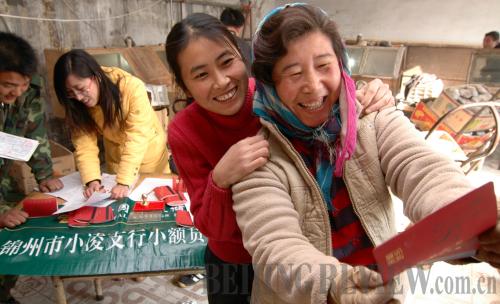|
 |
|
A HELPING HAND: Around 1,000 rural households in Jinzhou, northeast Liaoning Province, have received more than 60 million yuan ($8.8 million) in loans from the Jinzhou branch of the China Postal Savings Bank (LI TIECHENG) |
Recent decades have witnessed a rapid increase in the number of rags-to-near riches stories among farmers across the country. Among them is 43-year-old Zheng Qingxia, a farmer from Baiquan Village, Yixian County in north China's Hebei Province.
After marrying in 1987, Zhang and her husband spent their days toiling in the fields, but were hardly able to make ends meet. "We lived in an old and shabby house, saving every penny to pay for education for our two boys," she said. "Life was so difficult that my older son eventually had to drop out of school."
The couple's luck turned around in 1995 after they acquired a loan for 1,500 yuan ($220) under the micro-financing program of the Chinese Academy of Social Sciences (CASS). With the money, Zhang bought 10 pigs and eventually parlayed the proceeds of the investment into a bustling farm that now boasts 120 hogs and an annual income of more than 80,000 yuan ($11,715).
According to data from the National Bureau of Statistics, the per-capita net income of Chinese farmers hit a record 5,153 yuan ($757) in 2009.
"The initial money gave me a flicker of hope when I needed it most," said Zhang. "Otherwise I would still be living hand-to-mouth."
Zhang's loan was part of China's first microcredit program, a method of small lending to the poor that enables many to work their way out of poverty through self-employment and improvements to their lives.
Microcredit was almost the only option for farmers like Zhang since loans from banks and rural credit cooperatives were out of their reach. "They required either collateral or bank deposits as guarantee, of which I had neither," she said.
In addition, the microcredit borrowers were taught financial basics, and marketing and management skills to ensure their entrepreneurial success, said Du Xiaoshan, Deputy Director of the Rural Development Institute of CASS and head of the Yixian County program, in an interview with Xinhua News Agency.
Du said that microcredit programs tend to charge higher-than-average interest rates to cover operational costs and make the project self-sustaining, as well as stifle corruption associated with credit lending.
With an adequate strategy and effective management, the project has so far achieved excellent repayment rates and demonstrated the potential of microcredit as an effective tool for poverty reduction in China, Du said.
Microcredit started to take root in the early 1990s and spread to numerous impoverished counties in Hebei, Shaanxi, Sichuan, Jiangsu provinces and Guangxi Zhuang Autonomous Region. The Agricultural Bank of China and rural credit cooperatives have been responsible for the bulk of microlending. Around 300 non-government organizations (NGOs) in the country, such as the China Foundation for Poverty Alleviation, also contribute to the farmers' cause. Most NGOs, however, are small in scale and can only reach a limited number of farmers.
In May 2008, the People's Bank of China (PBOC), or the central bank, and China Banking Regulatory Commission (CBRC), the country's banking watchdog, initiated a pilot program to establish small lenders, a move expected to breathe fresh life into the country's poverty eradication efforts.
While the Chinese economy roared ahead, millions of Chinese farmers in the hinterlands were left out of the newfound prosperity, in part due to a lack of access to financing. Commercial banks consider them nearly insolvent, and a poorly developed credit guarantee system has only added to their reluctance to lend.
Microfinancing provides a viable solution to addressing the dearth of rural capital and allows the poor to improve their own lives, said Wu Xiaoling, former PBOC Vice Governor. The rural economy provides opportunities for farmers to start up their own businesses with the help of microfinancing, she said.
According to rough CBRC estimates, China has so far doled out more than 10 billion yuan ($1.46 billion) in small loans, benefiting more than 80 million of rural households.
But, microcredit is not without setbacks. NGOs are not allowed to take public deposits and contributions from private donors are starting to dry up, a development that has forced many of them to close their microcredit operations, said Du Xiaoshan of CASS.
Yi Gang, Vice Governor of PBOC, said it is necessary to build a safe legal environment for microfinance providers. For example, qualified operators should be given the green light to collect deposits with certain requirements, he said.
Tang Min, Deputy Secretary General of the China Development Research Foundation, agreed. "It is necessary to broaden the funding channels for microfinancing, such as low-interest credit from policy banks," he said. | 